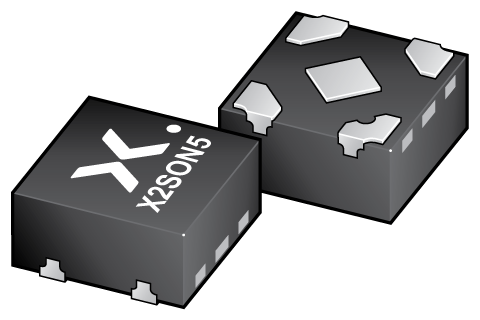
Register once, drag and drop ECAD models into your CAD tool and speed up your design.
Click here for more information74AXP1T34GX
Dual supply translating buffer
The 74AXP1T34 is a dual supply translating buffer. It features one input (A), an output (Y) and dual supply pins (VCCI and VCCO). The inputs are referenced to VCCI and the output is referenced to VCCO. All inputs can be connected directly to VCCI or GND. VCCI can be supplied at any voltage between 0.7 V and 2.75 V and VCCO can be supplied at any voltage between 1.2 V and 5.5 V. This feature allows voltage level translation.
Schmitt-trigger action at all inputs makes the circuit tolerant of slower input rise and fall times.
This device ensures very low static and dynamic power consumption across the entire supply range and is fully specified for partial power down applications using IOFF. The IOFF circuitry disables the output, preventing the potentially damaging backflow current through the device when it is powered down.
Features and benefits
Wide supply voltage range:
VCCI: 0.7 V to 2.75 V
VCCO: 1.2 V to 5.5 V
Low input capacitance; CI = 0.6 pF (typical)
Low output capacitance; CO = 1.8 pF (typical)
Low dynamic power consumption; CPD = 0.4 pF at VCCI = 1.2 V (typical)
Low dynamic power consumption; CPD = 7.1 pF at VCCO = 3.3 V (typical)
Low static power consumption; ICCI = 0.5 μA (85 °C maximum)
Low static power consumption; ICCO = 1.8 μA (85 °C maximum)
High noise immunity
Complies with JEDEC standard:
JESD8-12A.01 (1.1 V to 1.3 V; A input)
JESD8-11A.01 (1.4 V to 1.6 V)
JESD8-7A (1.65 V to 1.95 V)
JESD8-5A.01 (2.3 V to 2.7 V)
JESD8-C (2.7 V to 3.6 V; Y output)
JESD12-6 (4.5 V to 5.5 V; Y output)
ESD protection:
HBM ANSI/ESDA/JEDEC JS-001 Class 2 exceeds 2000 V
CDM JESD22-C101E exceeds 1000 V
Latch-up performance exceeds 100 mA per JESD78D Class II
Inputs accept voltages up to 2.75 V
Low noise overshoot and undershoot < 10% of VCCO
IOFF circuitry provides partial power-down mode operation
Multiple package options
Specified from -40 °C to +85 °C
參數(shù)類型
| 型號 | VCC(A) (V) | VCC(B) (V) | Logic switching levels | Output drive capability (mA) | tpd (ns) | Nr of bits | Power dissipation considerations | Tamb (°C) | Rth(j-a) (K/W) | Ψth(j-top) (K/W) | Rth(j-c) (K/W) | Package name |
|---|---|---|---|---|---|---|---|---|---|---|---|---|
|
74AXP1T34GX
|
0.7?-?2.75 | 1.2?-?5.5 | CMOS | ± 12 | 4.7 | 1 | ultra low | -40~85 | 306 | 76.7 | 177 | X2SON5 |
封裝
下表中的所有產(chǎn)品型號均已停產(chǎn) 。
| 型號 | 可訂購的器件編號,(訂購碼(12NC)) | 狀態(tài) | 標(biāo)示 | 封裝 | 外形圖 | 回流焊/波峰焊 | 包裝 |
|---|---|---|---|---|---|---|---|
|
74AXP1T34GX
|
74AXP1T34GXH (935306995125) |
Withdrawn / End-of-life |

X2SON5 (SOT1226-3) |
SOT1226-3 | SOT1226-3_125 |
Series
文檔 (9)
| 文件名稱 | 標(biāo)題 | 類型 | 日期 |
|---|---|---|---|
| 74AXP1T34 | Dual supply translating buffer | Data sheet | 2022-02-02 |
| AN90029 | Pin FMEA for AXPnT family | Application note | 2021-07-13 |
| Nexperia_document_guide_Logic_translators | Nexperia Logic Translators | Brochure | 2021-04-12 |
| SOT1226-3 | 3D model for products with SOT1226-3 package | Design support | 2021-01-28 |
| axp1t34 | 74AXP1T34 IBIS model | IBIS model | 2016-04-27 |
| Nexperia_document_leaflet_Logic_AXP_technology_portfolio_201904 | AXP – Extremely low-power logic technology portfolio | Leaflet | 2019-04-05 |
| Nexperia_document_leaflet_Logic_X2SON_packages_062018 | X2SON ultra-small 4, 5, 6 & 8-pin leadless packages | Leaflet | 2018-06-05 |
| SOT1226-3 | plastic thermal enhanced extremely thin small outline package; no leads;5 terminals; body 0.8 x 0.8 x 0.32 mm | Package information | 2020-08-27 |
| 74AXP1T34GX_Nexperia_Product_Reliability | 74AXP1T34GX Nexperia Product Reliability | Quality document | 2025-03-20 |
Longevity
The Nexperia Longevity Program is aimed to provide our customers information from time to time about the expected time that our products can be ordered. The NLP is reviewed and updated regularly by our Executive Management Team. View our longevity program here.
訂購、定價(jià)與供貨
| 型號 | Orderable part number | Ordering code (12NC) | 狀態(tài) | 包裝 | Packing Quantity | 在線購買 |
|---|
樣品
作為 Nexperia 的客戶,您可以通過我們的銷售機(jī)構(gòu)訂購樣品。
如果您沒有 Nexperia 的直接賬戶,我們的全球和地區(qū)分銷商網(wǎng)絡(luò)可為您提供 Nexperia 樣品支持。查看官方經(jīng)銷商列表。
How does it work?
The interactive datasheets are based on the Nexperia MOSFET precision electrothermal models. With our interactive datasheets you can simply specify your own conditions interactively. Start by changing the values of the conditions. You can do this by using the sliders in the condition fields. By dragging the sliders you will see how the MOSFET will perform at the new conditions set.